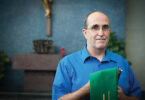
Leon Suprenant is the pastoral associate for administration in the office of the permanent diaconate. He also blogs at: www.archkck.org/blog.
by Leon Suprenant
The church teaches that a deacon, at his ordination, receives an indelible spiritual character that permanently identifies him as a minister of Christ.
At that time, he ceases to be a layman. The deacon is ordained for diakonia, or service, and this quality must pervade his readiness to serve the church.
In fact, St. John Paul II wrote that “sacramental grace gives deacons the necessary strength to serve the people of God in the diakonia of the liturgy, of the word, and of charity, in communion with the bishop and his presbyterate.” There is a fundamental and necessary interplay of liturgy, word and charity in the ministry of the deacon.
When Jesus emptied himself and took the form of a servant (cf. Phil 2:7), he gave us the preeminent model of diakonia, or service. Deacons, then, are called to pattern themselves after Christ the servant and empty themselves in their threefold ministry of liturgy, word and charity.
The deacon’s self-giving service at both the table of sacrifice and the table of charity helps us understand the identity and function of the deacon at Mass. If the deacon serves at the altar, he must also serve in charity among the people of God — and vice versa.
He must be the voice of God’s people in their time of need. For that reason, the deacon is the ordinary minister of the Kyrie (“Lord, have mercy”), all litanies and even the general intercessions, which really are the prototype of diaconal prayer.
And in his movement from church to world and world to church, the deacon is also uniquely positioned, by virtue of his intimacy with both, to invite the assembly to share the sign of peace, to kneel and to bow their heads.
In recommending the restoration of the permanent diaconate in our time, Vatican II’s Decree on the Church’s Missionary Activity noted that there already are laymen who are carrying out the functions of the deacon’s office, such as by preaching the word of God as catechists or by engaging in charitable works of mercy.
The decree concludes: “It is only right to strengthen them by the imposition of hands which has come down from the Apostles, and to bind them more closely to the altar, that they may carry out their ministry more effectively because of the sacramental grace of the diaconate”(16).
Notice the connection between “the altar” and the practice of charity. Without this close binding to the altar, the deacon would be indistinguishable from a social worker.
Yet without the practice of charity, the deacon on the altar would be indistinguishable from an altar server.
But to the extent the deacon integrates his self-emptying service of the liturgy, word and charity, he acts in the person of Christ the servant, bearing witness to God’s loving concern for everyone.

